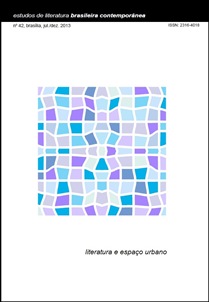Estação Carandiru e o mundo construído pelas formas de nomeação
DOI:
https://doi.org/10.1590/S2316-40182013000200003Abstract
No contexto da emergência de narrativas literárias que tangenciam a crônica policial, observada no final dos anos de 1990, é publicado o romance Estação Carandiru, de Drauzio Varella. Inscrito no conjunto de textos cujos autores são estreantes em sua maioria e do qual fazem parte, ainda, as obras Cidade de Deus, de Paulo Lins, Pavilhão Nove, de Hosmany Ramos, e Capão Pecado, de Ferréz, dentre outras, o romance configura uma realidade urbana, contemporânea, realística por princípio e violenta segundo o senso comum que norteava a leitura de seus relatos. As histórias contadas, então, no formato romanesco, anteriormente, haviam circulado apenas enquanto fato jornalístico, tendo sido várias delas, posteriormente, adaptadas para o cinema. Este artigo propõe uma leitura do texto de Varella a partir das escolhas praticadas em seus processos de nomeação, os quais subsidiam a narração, consonante à configuração de narrador tradicional enunciada pelo filósofo Walter Benjamin. Quer, ainda, perscrutar os modos pelos quais o espaço, quase um personagem da história narrada, é construído pelo discurso nomeador, em sua escassez e excessos.
Downloads
References
BENJAMIN, Walter (1994). Obras escolhidas II: Magia e técnica, arte e política. Tradução de João Paulo Rouanet. 7. ed. São Paulo: Brasiliense.
________ (1995). Obras escolhidas II: Rua de mão única. Tradução de R. Rodrigues Torres Filho e J. C. Martins Barbosa. 5. ed. São Paulo: Brasiliense.
CALVINO, Ãtalo (1995). As cidades invisíveis. Tradução de Diogo Mainardi. São Paulo: Companhia das Letras.
MURICY, Katia (1998). Alegorias da dialética: imagem e pensamento em Walter Benjamin. Rio de Janeiro: Relume Dumará.
RICOEUR, Paul (1994). Tempo e narrativa. v. II. São Paulo: Papirus.
VARELLA, Dráuzio (1999). Estação Carandiru. São Paulo: Companhia das Letras.
Downloads
Published
How to Cite
Issue
Section
License
Authors who publish in this journal agree to the following terms:
a) The authors maintain the copyright and grant the journal the right of first publication, the work being simultaneously licensed under the Creative Commons Attribution License-Non Commercial 4.0 which allows the sharing of the work with acknowledgment of the authorship of the work and publication this journal.
b) Authors are authorized to enter into additional contracts separately, for non-exclusive distribution of the version of the work published in this journal (eg publish in institutional repository or as a book chapter), with authorship recognition and publication in this journal.
c) Authors are allowed and encouraged to publish and distribute their work online (eg in institutional repositories or on their personal page) after the editorial process, as this can generate productive changes, as well as increase the impact and citation of published work (See The Effect of Free Access).
d) The authors of the approved works authorize the magazine to, after publication, transfer its content for reproduction in content crawlers, virtual libraries and the like.
e) The authors assume that the texts submitted to the publication are of their original creation, being fully responsible for their content in the event of possible opposition by third parties.


